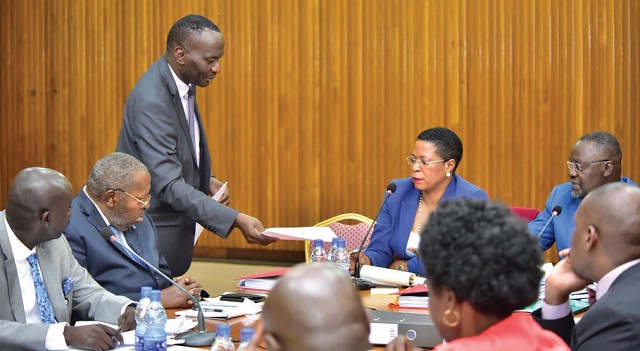
COSASE shouldn’t sacrifice economic stability at the altar of publicity as it could collapse the economy
COMMENT | SIMON MUTUNGI | The Chairman of the parliamentary Committee on Commissions, Statutory Authorities and State Enterprises (COSASE) Abdu Katuntu (MP Bugweri County) rejected President Yoweri Museveni’s advice to hold the committee proceedings on Bank of Uganda (BoU) operations in-camera, behind closed doors instead of doing it publicly. While Katuntu’s intentions of opening the probe to the public for transparency purposes are noble; especially in corruption riddled Ugandan institutions, they could be equally disastrous.
The banking and finance industry is at the heart of a country’s economy in that it plays the intermediary role of allocating financial resources from suppliers of capital to the users of capital. If this vehicle of capital flow were to be or appear to be compromised, there would be economy-wide implications. Therefore, the finance sector is a highly sensitive one and extreme caution must be exercised when deliberating the issues affecting it.
A closed door probe ensures this caution in as much as it gives some degree of control over which information should be released to the public. An in-camera probe will prevent any false or unverified information from entering the public space which will hurt the sector, regardless of whether that data is later recanted or not. Even if the information is actually correct and true, releasing some of it to the public may equally be disastrous. This is due to two main reasons namely: public panic and information contagion.
Hypothetically, if tomorrow, during the probe, BoU Governor Emmanuel Mutebile while under oath, publicly disclosed that some bank was struggling, there would be widespread fear among that bank’s clients. This would cause a run on that bank, that is, almost all its customers would rush to withdraw their respective deposits.
Although this may seem rational, it actually is needless, considering depositors money is insured by the Uganda Deposit Protection Fund.
Such a run on the bank is also potentially catastrophic to the economy. This is because it could likely result into the bank shutting down if it cannot simultaneously meet the liquidity demands of all its clients. If this bank was a big institution (Systemically Important Financial Institution), its closure could pose systemic risk to the entire economy. This is the possibility that it could trigger severe instability or collapse an entire industry or economy.
Further, due to information contagion between banks accruing from common counterparty exposures and common asset holdings, the public release of bad information about one bank provides information about other banks. Therefore, bad information about one bank causes depositors to suspect common shock which will resultantly provoke a run on these other banks regardless of their health.
This can also lead to cash-hoarding by the healthy banks out of fear of being illiquid which could greatly reduce the flow of credit in the economy. Banks are highly interlinked through the payment system. With the net settlement systems, for instance, banks send many payment orders to other banks and these are netted and settled. If a bank were to hoard cash and fail to settle the payment obligations it has accumulated to other banks, those other banks would default on their respective payment obligations. This, as one can imagine, would lead to a banking crisis, which in light of the above explanation and vast literature and research, could easily turn into an economic crisis.
This is best evidenced by the Great Recession of the 1930s when due to destroyed public faith in American banks, millions rushed to banks to have their deposits withdrawn. However, the banking system was unable to keep up with the panicked withdrawals that customers were making from their bank accounts, rendering banks incapable of providing money many customers had deposited and performing their intermediary function. This only exacerbated the recession forcing then U.S. President, Franklin Roosevelt to declare a bank holiday where a moratorium on bank deposit withdraws was issued so as to save the banks and consequently the economy.
 The Independent Uganda: You get the Truth we Pay the Price
The Independent Uganda: You get the Truth we Pay the Price




Wonderful site. Lots of helpful information here. I’m sending
it to a few friends ans additionally sharing
in delicious. And of course, thanks to your effort!